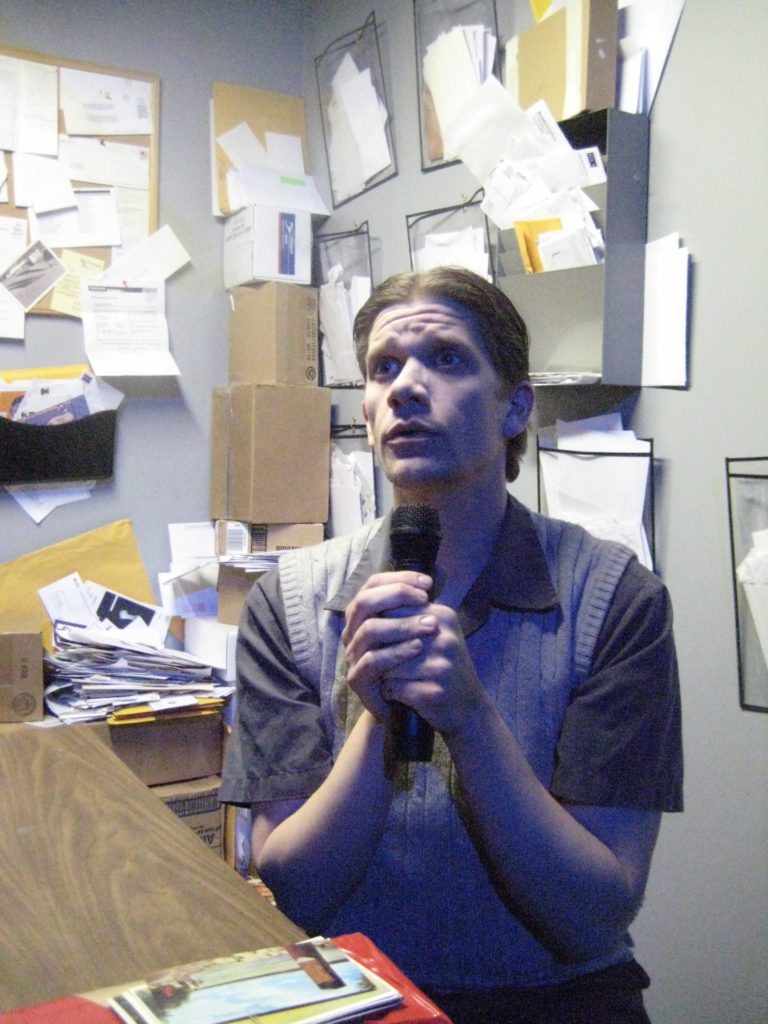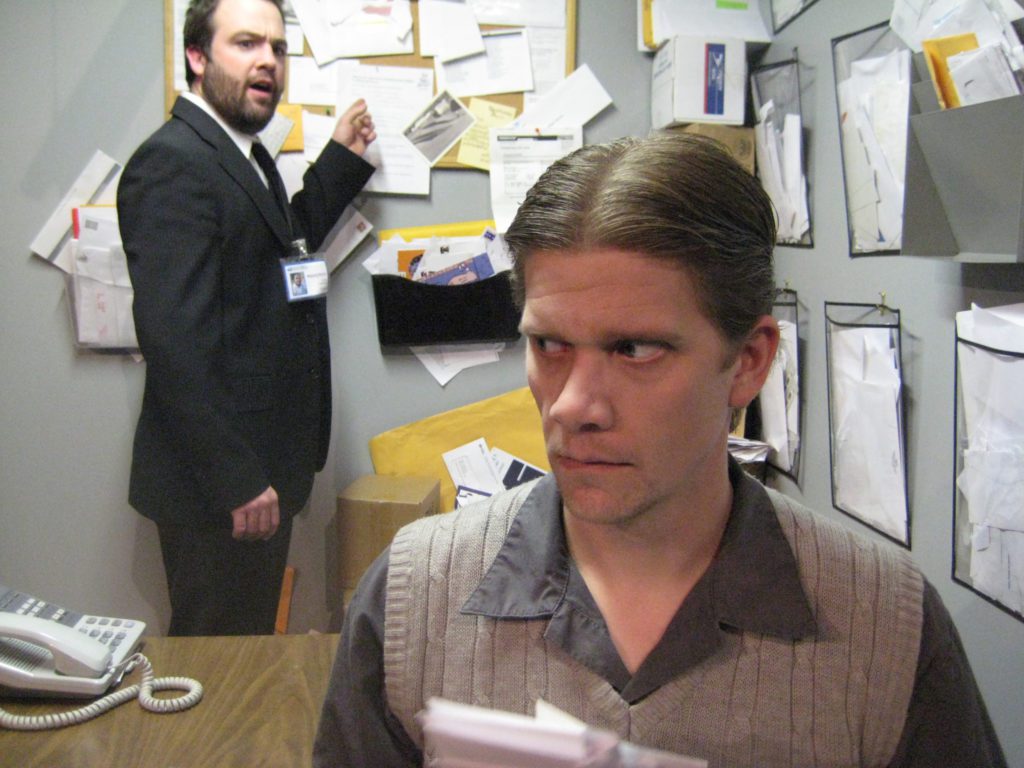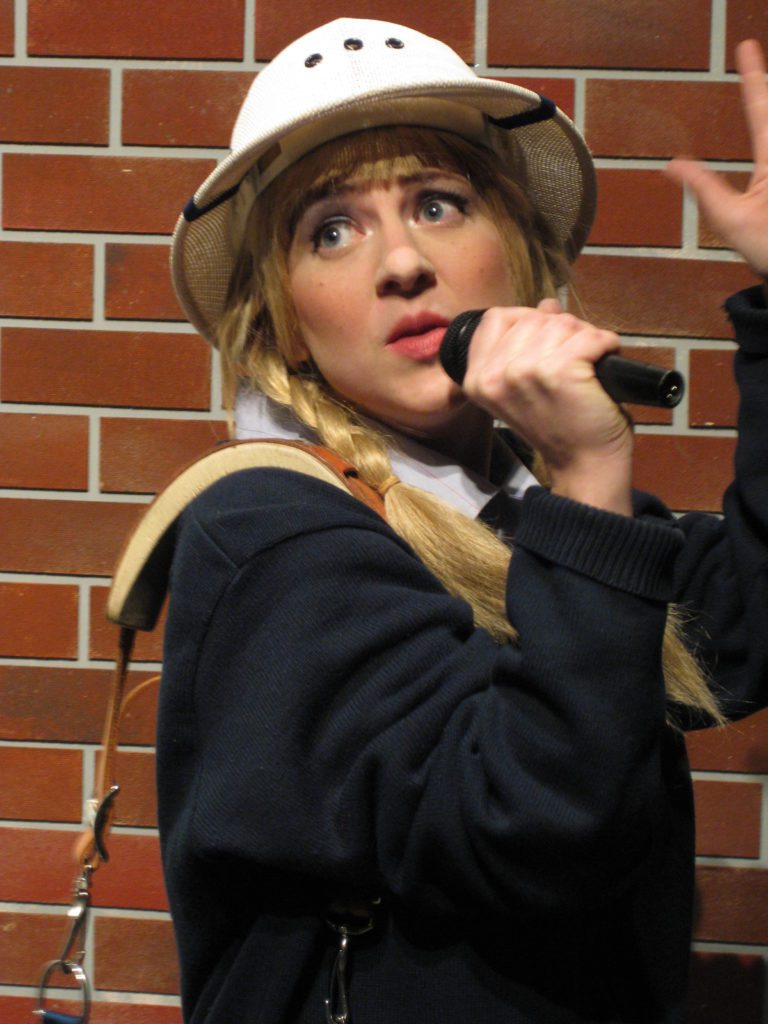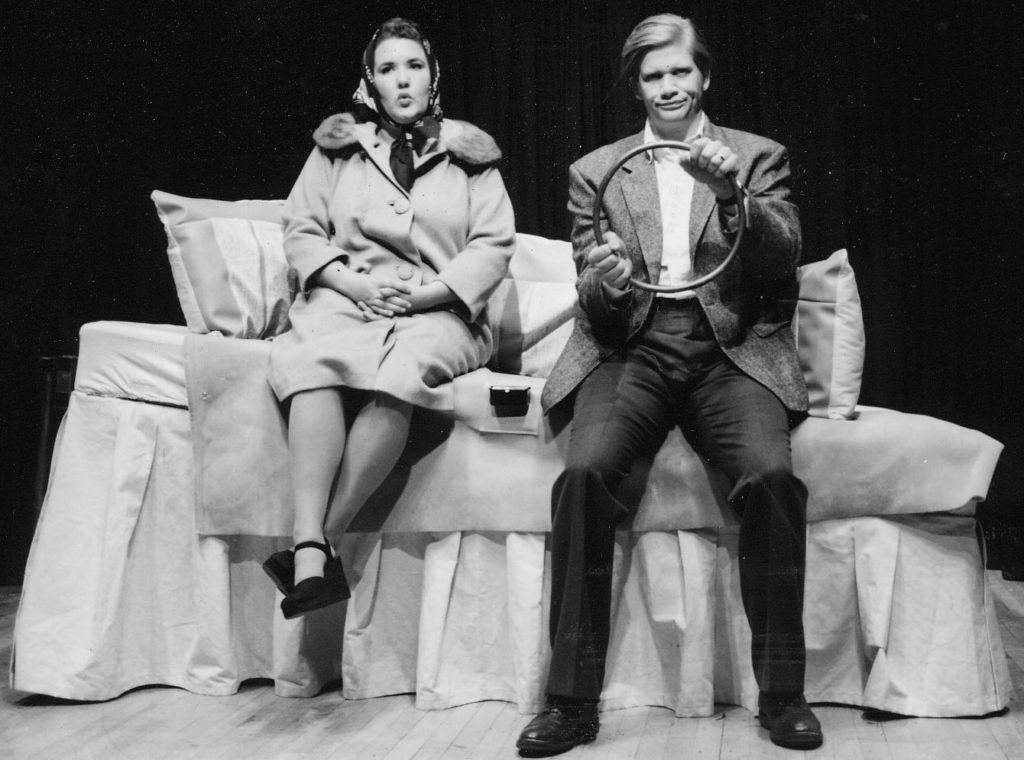Using the post office as a central metaphor for mankind’s interconnectedness, Seal. Stamp. Send. Bang. follows four different protagonists through an “ordinary” day. (more…)


Using the post office as a central metaphor for mankind’s interconnectedness, Seal. Stamp. Send. Bang. follows four different protagonists through an “ordinary” day. (more…)

When I first attended a Buntport Theater Company production and found six people in the audience – myself and my friend two of them – I’d never have predicted that the troupe would make it ten years. Other smart and talented companies have fallen by the wayside, but the six Buntporters, who met at Colorado College, moved to Denver and create all their material collaboratively, just keep on going. For this anniversary season, they’ve chosen to remount some past productions and do staged readings of a couple of others. Some might see this as a copout or a year-long semi-vacation – and I’m sure it’s partly that. But it’s also an opportunity for the members to examine past material and get a sense of where they might yet go. And for viewers who haven’t yet experienced their quirky, experimental brand of theater, it’s a chance to catch up.
The company has done a lot of exploring in ten years. Buntport has created spoofs of well-worn genres; rock musicals; horror; a serious, low-key domestic play; and another that’s upside-down political. Everything it does testifies to the power inherent in objects – which sometimes become people – as well as the crazy malleability of the physical universe and the centrality of the actor, who creates entire new realities with nothing but his mind, voice and body. The sets are cheap and inventive, the scripts a mix of brilliance and silliness. Among the shows Buntport will reprise this year are Seal. Stamp. Send. Bang., a ridiculously funny takeoff on the postal system; Winter in Graupel Bay, a bittersweet evocation of small-town life; The 30th of Baydak, which reminds us of the grim reality of life under dictatorship; and perhaps my favorite Buntport show ever, Kafka on Ice, a play I thought would never come back because some nasty human had stolen the artificial ice on which the action takes place.
The first revival, Moby Dick Unread, opened last week. The inspiration is literary, and the tone veers dangerously between satire and homage. Someone in the troupe – or perhaps everyone – loves Melville and wanted to spend weeks immersed in his great novel. But what caught Buntport’s attention was not the overarching story of Captain Ahab and his nemesis, but all the quirks and diversions. Where producers usually streamline novels, the Buntporters focused on Melville’s disquisitions about carpentry, whether the whale is or isn’t a fish, Garnery’s paintings of whales and whaling, and the difference between a fast and a loose fish. They found humor in Moby Dick, and also moments of poignance – such as Pip’s near-drowning and subsequent madness. Inevitably, this means there’s a shagginess, even formlessness, to the production, but it’s faithful to the discursive nature of the book. Mercifully, it’s also much, much shorter.
Other Buntportian hallmarks include self-mockery. The actors frequently draw our attention to the artificiality of what they’re doing. They switch roles by donning a hat or doffing a sock. The sea is a group of buckets suspended by ropes, the harpoon a spoon, Jonah’s whale a chalk drawing. “We’re making do,” everyone keeps assuring us. But we only need a chalk outline or a toy to represent the whale, since it’s the concept of whaleness that Buntport is evoking.
When I lived in New York, experimental theater was contemptuous at the core. You – the audience – were the bourgeoisie, and you were there to be scorned and made uncomfortable. The actors might yell in your face, or jump over you, or release live rats among the seats. The Buntporters are exploring some artistic edges, but they’re doing it in the most genial way possible. The floor gets very wet in Moby Dick Unread. So at the end, after the applause, the actors walk forward and – almost before you can figure out what they’re holding under their arms – unroll strips of carpeting so you can get to the exit without slipping. How can you not love these guys?There are also moments of unexpected beauty: The prologue is performed by Eric Edborg, who summarizes the entire plot by chasing a wind-up white whale around a tank of water – but then he suddenly sends a long arc of glistening spray from one end of the playing area to the other. The other performers – all energetic and delightful – are Erin Rollman, Hannah Duggan and Brian Colonna.
-Juliet Wittman, September 23, 2010, Westword

THAR SHE BLOWS
Four performers, one boat on wheels and a few buckets of water add up to all 135 chapters of Melville’s classic novel.

The talented folks at Buntport Theater have set their sights on musical theatre, creating their first all-original musical (their now legendary musical version of Titus Andronicus was based on Shakespeare, after all). They have taken the U.S. Postal Service as their “central metaphor for interconnectedness,” and built Seal. Stamp. Send. Bang. The result is a fun, funny, clever, unpredictable, and entertaining musical.
Seal. Stamp. Send. Bang. is the story of how the lives of eight characters intertwine. Several of them work for the Postal Service, and the mail plays a pivotal role in most of the surprising twists and turns the story takes. While there is a plot, this production is more about characters and relationships than storyline. Each new revealed connection between characters completes a piece of the story, until everything comes together by the end.
The script is what we expect from Buntport – an interesting story with diverse and well-developed characters that create unexpected situations and outcomes. Adam Stone has injected clever lyrics and synth-pop music that fit the story and the characters singing them well. The funniest number involves a singing and dancing package.
The production is well directed, though as with everything Buntport, direction is a collaborative effort. The timing is tight, perfect for quick comedy, and the constant details and small creative bursts seem limitless. The songs are integrated into the action on stage well, without any pretentious buildup or false theatricality.
Erin Rollman anchors the show as Susan, a cheerful, exuberant, optimistic mail carrier. The unlikely corner of a love triangle based on misunderstandings, she is happily oblivious to much of what goes on around her. Jason, played by Erik Edborg, is compulsive and voyeuristic as he deals with “dead letters” that can’t be delivered. Edborg captures the essence of someone trapped inside an office, constantly looking at other people’s mail, but officially only enough to get a delivery address. Brian Colonna is Richard, the sadistic yet mousy security enforcer, always looking to catch someone doing something wrong. Daphne, played psychotically by Hannah Duggan, is a woman on the edge. She is seething with anger, but the expression of that anger is annoying and, well, just weird – but hilariously so. Rounding out things on stage is Evan Weissman, playing all the other roles needed. As Ethan, he is sheepish and infatuated, but unable to express his love directly. But he transforms himself completely into several other characters as well.
The set is modular and integrated well into the show, with several different homes transforming into offices, interiors, or mail trucks when needed. The lighting is clever, much more of an element than in past Buntport shows. I particularly liked the creative follow spot use, run deftly from the booth by SamAnTha Schmitz. The costumes were appropriate, with each helping to reinforce the character wearing it. This show also called for a higher level of sound integration, which worked well for the most part. The transition in mid-song from full reinforcement to a simulated Walkman sound was very clever.
Seal. Stamp. Send. Bang. is just plain fun. The music is interesting and enjoyable, the choreography is silly and a wonderful parody of musical theatre, and the hilarious story twists will catch you off guard. The play is about interconnections and misconnections, and while there may not be as much depth or insight as in recent Buntport offerings, that doesn’t matter. This show is about fun, comedy, and entertainment, and it hits that target squarely on the bulls-eye.
—Craig Williamson, March 19, 2009, North Denver Tribune

Don’t underestimate the silly.
Done well, silly is of inestimable value (although I will try to estimate it herein). And at the top of their game, nobody does silly like Buntport Theater Company.
Seal. Stamp. Send. Bang. reveals the musical theater talents of the troupe’s five performers, who are a) fair to middling and b) brilliant. As always, they work in collaboration with Samantha Schmitz, who does bang-up technical and design work here.Their 25th original piece (can we just bow down to that achievement for a moment, please?) is, of all things, a musical. A synth-pop, ’80s-inflected, joyous story of lonely lives intersecting via the absurdity of the U.S. Postal Service.
Of course, it doesn’t help to catch the first 30 minutes of American Idol (fixed, I tell you, fixed!) before heading over to the theater. Five minutes and several missed notes in, my brain was showing the hand to Simon Cowell and telling him to stop being so mean. Because, despite the fact that none of these performers are gifted singers – a fact they cop to in the program – all of them have pleasant voices. More important, they know how to put over a song. Because they are, first, actors, and they get that singing a song is telling a story. They get an invaluable boost from Adam Stone, who wrote music and lyrics that are both catchy and clever, acknowledging musical theater conventions (check out that 11 o’clock number at 9:15) but not falling off the cliff of parody as so many recent musicals do.
Erin Rollman’s Susan is a blond-braided mail carrier, licking her wounds from her divorce and oblivious to the besotted Pete (Evan Weissman, who takes on three fully realized roles here), who drops unaddressed postcards into the mail in the hope that she’ll hear his words of love. Seal. Stamp. Send. Bang. is full of loopy interconnections of the Seinfeld sort, as diabetes, postcards and Tennyson crop up in unexpected places. It all plays out on the street of neatly crafted home fronts and Astroturf lawns, where each home spins around to reveal a mail truck, a deathly fluorescent office and home interiors.
Pete, the neighbor, responds to his mail carrier’s presence with the most ludicrous of love songs, singing:
I know you’re fragile
I’d handle you with care
Package you with peanuts
And bubble wrap your hair
Meanwhile, sad, strange Jason (Erik Edborg) is trapped in the dead-letter office, a soulless room out of Office Space where he spends his days trying to divine the source of dead letters, until a sadistic postal inspector (Brian Colonna, truly maniacal) shows up with questions and an electric-shock dog collar.
When he goes home, he finds his cousin, or sort of his cousin. No one quite knows, as evidenced in a riotously funny patter (edging on rap) song in which the two argue over how they are related. It’s also one of the best-staged songs; I only wish there had been more choreography from this group’s strange collective imagination. As the cousin, Hannah Duggan gets the night’s biggest laughs, beginning with her demented grunts and culminating in an entire song sung from the inside of a cardboard box. The idea that theater has lasted 3,000 years without a cardboard box singing and dancing onstage is criminal at the very least.
There’s no message to take away here. Even the bittersweet is mostly sweet. What you get, though, is a 75-minute, fully realized musical (the score is tracked) – and, for an extra $10, you can take home your own original cast recording.
—Lisa Bornstein, March 6, 2009, IWantMyRocky.com

You might expect, even hope, for Buntport Theater’s first full foray into musical theater to be an act of all-out comic subversion. Instead, the unusually titled “Seal. Stamp. Send. Bang.” is a surprisingly heartfelt and fun homage to the form.
Well, wait a minute. There is that song where the postal inspector tortures a naughty employee with an electric dog collar. And there’s the letter carrier who decides the “bird dirt” on her windshield is the sure sign of a coming epiphany. And there’s that, shall we say, detonative climax. (Sorry, but the last word of the title is a dead giveaway.)
Even still, yes, “S.S.S.B.” is a surprisingly heartfelt and fun homage to the form. Really.
It’s just not fully realized.
Buntport, a highly regarded ensemble that stages only original works it creates in collaboration, embraces whimsical musical conventions. But it takes the genre in its own distinct misdirection, too – one Buntport fans should relish, while hard-core musical geeks may find it just a bit out of reach.
As its quadrangular title suggests, “S.S.S.B.” is not so much an arc as a square: It’s four distinct stories tenuously connected by a postcard, making for an evening of right angles, at once exciting and discombobulating, peppered with starbursts of creative fancies.
Recalling both the whimsy of “Avenue Q” and the melancholy of Buntport’s own “Winter in Graupel Bay,” “S.S.S.B.” explores loneliness and the fragile interconnectedness between neighbors – while singing unabashedly fun synth- pop songs by Adam Stone to taped Casio accompaniment.
The horizontal set is a block of four home fronts that spin around and transform into cars, offices and even rooms inside homes!
The story plays out like a film that follows an object rather than a single character.
The tale jumps the shark when masochistic postal inspector Richard (Brian Colonna) busts Jason for his peeking too far into these letters, performing a strange torture song that’s perhaps a nod to the dentist from “Little Shop of Horrors.” We never fully recover from that abrupt change in tenor, but the journey of the postcard – depicting a man sitting alone by a lake – goes on.We first meet letter carrier Susan (Erin Rollman), who bursts into “Bird Poop Angel,” a clever nod to “Pippin”like “Corner of the Sky” show tunes. Shy Pete (Evan Weissman) drops unaddressed postcards into a big blue mailbox. But Susan, not knowing they are meant for her, delivers them to the dead-letter office. There, office drone Jason (Erik Edborg) revels in the stories told within all this misdirected correspondence.
This staging constantly straddles the line between brilliant and incongruous. That is, until Hannah Duggan sends the show into the stratosphere. In the final chapter, she plays Daphne, a shifty gal with a nasal affliction that makes her snort like a pig. Not to give away why, but when Daphne breaks into the song “My Bomb and I” while stuffed in a box and waiting to be mailed, brilliant wins out.
But at 70 minutes, “S.S.S.B.” is too short and doesn’t ever congeal into a meaningful whole. Characters are introduced and dropped. There are too many loose ends. Much is never resolved.
Buntport always drops little smart bombs into its shows, too, but here the high jinks compete with the highbrow. You can do a musical that’s about the search for meaning and connection without indulging so much in Tennyson, Kafka and Shakespeare.
This is a musical, after all, and I know one thing about musicals: Most are pretty dumb. What works so well here is the impossible perkiness; the sweet, unexpressed crushes; the dorky personal-pronoun ballads; the peppy group show tunes.
“S.S.S.B.” marks the continued evolution of a fearless, funny and fiercely intelligent ensemble. (One that, it turns out, has been hiding some surprisingly nice singing voices.)
Just stick to the cheese – and skip the spontaneous combustion.
—John Moore, March 6, 2009, Denver Post

Buntport Theater’s new musical, Seal. Stamp. Send. Bang., has deep roots in Colorado Springs.
All six of the ensemble’s members – Erin Rollman, Erik Edborg, Brian Colonna, Hannah Duggan, Evan Weissman and Samantha Schmitz – graduated from Colorado College between 1996 and 2001. They opened their central Denver theater in 2001, and since then have written, performed and produced 25 original plays and 100 episodes of their now-retired live sitcoms, Magnets on the Fridge and Starship Troy.
They had dabbled with karaoke versions of songs in a few productions (see: Kafka on Ice), but the troupe had never written and performed a true musical. It was a chance meeting about a year ago that compelled them to make the jump: The group taught a class for CC’s drama department, and through that met senior Adam Stone, a theater major who composes what he calls “synth-pop.”
“Adam,” says Weissman, “can write music in a way – in a speed and with a sensibility – that we’re used to.”
(For a group who used to write one 45-minute sitcom episode every other week for six months out of the year, that means really fast.)
Of course, the performers admit in the show’s program that none of them are trained singers or musicians. And after seeing a performance, I’d say none are likely to win American Idol, though perhaps a few (Weissman and Duggan, in particular) could make it to the Hollywood round.
Buntport is known in Denver for its amazing, low-budget, modular sets and creative costumes, and Seal carries on that tradition. The set features four large boxes on wheels. House fronts, with doors and mailboxes, decorate one side of each box. When the boxes are wheeled around by a cast member, four different mini-sets appear: a mail truck, a living room, the postal service’s dead letter office and a kitchen. Simple touches, such as a beaded seat cover in the truck and a garden statue outside one of the homes, provide charm.
Take the set, and add to it a dysfunctional love triangle and familial grudge that revolve around unaddressed mail and the post office; original songs like “Bird Dirt Angel,” “Dead Letter Lover” and “My Bomb and I”; and actors who, according to Weissman, “like to rock out a little,” and you’ve got the promise of a winner.
Buntport’s ultimate strength, though, is in its acting. The six members know exactly what and when to play up or down. Sometimes, you want to laugh, other times you want to cry, and other times you want to cry because you’re laughing so hard. When Pete (played by Weissman) sings about Susan (Rollman), “I know you’re fragile, I’d handle you with care / Package you with peanuts and bubble wrap your hair,” you can’t help but feel for him.
It must be said, though, while Seal‘s concept is clever and its music hum-worthy, its ending can leave you wondering, “What just happened?” Perhaps there is heavy analysis to be found in its conclusion, but at first blush it feels more like Buntport traded a satisfying resolution for a low-budget (though cool) special effect.
Still, all in all, if you’re looking for a night of inspired zaniness, you’ll get it, as Stevie Wonder might say, “Signed. Sealed. Delivered.”
—Kirsten Akens, March 5, 2009 , Colorado Springs Independent

Buntport Theater is taking its first full original musical seriously. They’ll tell you so . . . just as soon as they finish their smokes.
As one actor is interviewed, he apologizes for speaking so softly. “That’s because we’re professionals,” he says with mock earnestness, “and we must protect our voices.”
Just how soberly are Denver’s popular insurrectionists taking (on) the musical form in “Seal. Stamp. Send. Bang.,” their 26th original production?
“The very first number has a woman singing about bird poop on her windshield that she believes is in the shape of an angel,” said actress Erin Rollman. “So right from the get-go, you can see that things are a little bit off.”
But lest you think Buntport has set out to merely parody the most easily parodied of American art forms, know that this acclaimed collective harbors a dirty little secret.
“The truth is, we do like doing musical numbers, because they are fun and stupid,” said Hannah Duggan. “We are not at all musical-theater performers – but maybe we all secretly wish that we were.”
This is a sore subject for Brian Colonna. In his senior year of high school, he was asked not come to back to music rehearsals. Why?
“They seemed to think it was not a winning battle,” he said. To which Rollman interjects: “It’s important to note that in Spanish class, Brian was also asked to stop speaking Spanish. True story.”
For a decade, Buntport has made its theatrical name by primarily staging intelligent, quirky variations on known titles like “Something Is Rotten” (for “Hamlet”). But while “Seal” is its first full, unabashed musical, fans have come to adore the company’s sporadic and often unexpected forays into song and dance. Kitschy, awkwardly performed, note-imperfect song and dance.
“People like to hear songs they know, set to different words. That’s a given,” said Duggan. “And when it comes with really bad dancing and colorful costumes, you just can’t beat it.”
Here’s a look back at some classic musical moments in Buntport’s history:
“Titus Andronicus: The Musical.” Immediately after Titus’ daughter, Lavinia, has her tongue chopped off, Duggan breaks out into an aria version of Britney Spears’ “Oops, I Did It Again,” sending blood spurting out of her mouth. It’s funny, Rollman said, because it’s horrible.
“The juxtaposition between a Britney Spears song and a moment that’s post-rape mutilation seems … an odd juxtaposition,” deadpanned Erik Edborg.
That moment is just so peculiar, Colonna added, “that you are either going to laugh . . . or hate us.”
“James and the Giant Peach.” In this classic episode of the company’s biweekly serial “Magnets on the Fridge,” the gang is driving to New York so Nathan can see his beloved New York Jets play football. But along the way, “we run into a group of really nasty marine biologists wearing shark visors,” said Rollman, setting the stage for a showdown between jets and sharks (rimshot). Suddenly, a “West Side Story”-inspired gang fight/dance breaks out, to the tune of “The Jet Song.”
“It really took people by surprise,” said Rollman, “because it’s not until the music starts that you ‘get’ just how dumb all of this really is.”
“The Nutcracker.” In an episode of the serial “Starship Troy,” Colonna plays a pilot named Zoloft (half human and half Sansmolarian). He falls asleep and has a dream in which he dances with a giant golden calculator and enjoys a sugarplum- fairy dance with Edborg and Evan Weissman.
The broken calculator gets stuck on the number 55378008. “Which, when turned upside down, says, ‘Boobless,’ ” said Weissman. Added Rollman: “We’re nothing if not classy.”
The Flobots! Long before Denver’s latest breakout band went global, they were among the Buntport faithful. They were enlisted to play for a “Magnets” battle-of-the-bands episode. The woeful Buntport combo, armed only with songs about Vienna sausages, forfeits to the rockers, and the episode ends with Edborg and the band singing a cover of “The Final Countdown.”
“All that Crap.” The last of 100 combined episodes of “Magnets” and “Starship Troy” ended with Buntport’s homage to the musical “Chicago” – and itself.
To her credit, Rollman meticulously studied Bebe Neuwirth performing “All That Jazz” on YouTube, and (tried to) steal her every move. The number included a lot of heavy lifting – though, oddly, it was Weissman being lifted, not the women.
“We tried in our best fashion to put in as many Bob Fosse moves we could, even though none of us are dancers – at all,” Rollman said, provoking Weissman’s defensive retort, “Hey . . . I’m a dancer.”
“Always wearing sweatpants,” Duggan responded, “does not make you a dancer.”
Colonna says that number ably marked the end of the company’s massive undertaking. “This was an endeavor that composed eight years of our lives,” he said. “What could possibly speak to what all of that meant? Crap!”
“Seal. Stamp. Send. Bang.” This new musical is penned by Adam Stone, who took a class taught by the Buntport collective at their Colorado College alma mater. Colonna calls Stone “a synth-pop-music machine.”
The story follows four separate protagonists, using the U.S. Postal Service as a central metaphor for mankind’s interconnectedness. The group promises Stone’s music carries the troupe far beyond its penchant for silly karaoke-style pop songs.
“This is not a spoof of musicals,” Rollman said. “But like everything else we do, how we approach our musical is maybe a little bit different.”
But the benefit of performing original music, Rollman said, is obvious: “This way, you guys don’t know what the notes are supposed to be,” she said, “so good luck with that!”
John Moore, Denver Post

Now that the Buntport Theater Company is winding up its tenth season – filled with remounts of several past shows – it’s time to stop thinking of this troupe as talented kids who got together at Colorado College to create a theater style all their own, and instead consider them the creators of a distinct body of work. Still, it’s hard to generalize from the year’s mix of staged readings, extemporaneous evenings and full productions culminating in the current offering of two early one-acts which – as the program helpfully points out – have nothing to do with each other: And This Is My Significant Bother (2000), a series of scenes based on James Thurber’s short stories, and an insane, babbling interpretation of Cinderella (2003). You can pinpoint specific Buntport tendencies: clever work with objects; playfulness and humor; an inventive approach that continually constructs and deconstructs the very idea of theater itself; a love of language that means the Buntporters’ favorite writers, from Melville to Kafka, are treated with a wonderful mix of cheeky overfamiliarity and profound respect. This company likes dramatizing odd fragments of fact they come across: for instance, the trauma suffered by the poor brontosaurus after it was demoted and renamed by scientists (The Mythical Brontosaurus); the obsession of one Wilson Bentley, who spent his life photographing snowflakes (Winter in Graupel Bay); the actions of Niyazov, dictator of Turkmenistan, who upended all notions of truth and time in his country, in part by renaming the months of the year for himself (The 30th of Baydak).
At the beginning of This Is My Significant Bother – which was Brian Colonna’s senior thesis – four actors are lying on a large bed, their left arms over the coverlet and perfectly aligned, each wearing a wedding ring. James Thurber didn’t have a very positive view of marriage. His men tend to be put-upon dolts and the women bossy harridans. The tone is slightly waspish, also sad and, in an understated way, very funny. The actors – helped by the music of the Hoagies, who play things like “Making Whoopee” and “Two Sleepy People” – have caught it perfectly, giving their portrayals a sort of stubby elegance.
A man kills a spider at his wife’s behest and then huddles under the covers, terrified by a flittering bat; a couple argues in their car about where to eat and whether Donald Duck is a more significant cultural icon than Greta Garbo; a husband decides to kill his wife so he can marry his stenographer, and the wife, having gotten wind of this, tells him exactly how he’s to do it; a divorced woman fills in her successor on all her ex-husband’s idiosyncrasies while he silently and meticulously makes up the bed. And there’s a touching story about a failed love affair, the sentences punctuated by silences and blackouts. If this is an early effort, you can’t help reflecting, it’s certainly a sophisticated one.
Cinderella is an extended piece of intense silliness, narrated by a be-rouged Evan Weissman in what can only be called Manglish; the rest of the cast speaks pure gibberish. The play begins when Cinderella’s sweet-faced mother (Erin Rollman) gives birth and almost instantly transforms into the Wicked Stepmother. She does this through a very clever costume change that forces her to walk backwards through the rest of the action. (Evil usually does occur when good is distorted or turned on its head, right? That’s why the word “sinister” is connected with left-handedness and the left side of things in general.) Doubling is a central theme in Cinderella. Both stepsisters are played by Hannah Duggan, wearing an asymmetrical wig and two different shoes. Erik Edborg, the tallest member of the troupe, is our heroine. He’s comforted in his sad predicament by his own left hand, which sings opera to him. When he’s dressed up for the ball, he’s represented by a simpering doll through another piece of costume magic. Weissman’s narrator becomes the Prince. The coach is signified by a pair of horses clipped to a hat, the importance of Cinderella’s leaving the ball by midnight emphasized by the clocks on the breast of her ball gown. “Your Feet’s Too Big,” the Hoagies sing helpfully, as an ugly sister tries to cram on that mythical slipper.
There’s no predicting what the next ten years at Buntport will bring, but we know they won’t be boring.
-Juliet Wittman, June 7, 2011, Westword

One of the perils of an English education is that it leaves gaps. While I and any of my old school friends could discuss Shaw, Shakespeare, Jane Austen, George Orwell and Virginia Woolf at some length — and on a more contemporary note, I’d be happy to talk your ear off about Zadie Smith and Salman Rushdie — I’ve read very little of Steinbeck, Hemingway and quite a few other American heavyweights. Of Herman Melville, I know only “Bartleby, the Scrivener.”
When members of Buntport Theater promise that you don’t have to have read Moby-Dick in order to enjoy their Moby Dick Unread (in fact, they suggest that you see the production, then impress your friends by pretending you’ve read the novel), they’re telling the truth. I did enjoy the play.
Most stage and film adaptations of novels emphasize the story line, streamlining the action and trimming away minor scenes, the author’s digressions, sometimes a subplot or two. But the Buntport team announces proudly, “This is Moby-Dick with all the fat.” They linger lovingly on Pip’s ordeal alone in the vast sea and the arcana of an actual historic London court case on whale fishery that made a careful distinction between a “fast fish” and a “loose fish.” The result is a kind of serio-comic glossary, a meditation on Melville’s masterwork. It’s also as inventive as everything Buntport does, making clever use of space arrangements and objects (a rope ladder, buckets of water suspended from the ceiling) and combining parody and homage.
As always, the actors create their low-tech special effects with what seems like touching earnestness while their faces and bodies offer ironic comments: Look, we’ve drawn a large chalk whale on the back wall. Laugh all you want, but notice that it’s also resonant with meaning. Perhaps even mythic. Think of the vastness of the sea, the mystery of these huge creatures. Think of Job. Oh, come on, folks — don’t get that serious. It’s just a chalk drawing. “We’re making do,” various members of the cast keep telling us after particularly iffy or unexpected pieces of business. Because the style is so unpretentious, the heavy subject matter seems light and palatable, yet it’s never trivialized. Rather than coming between you and Melville’s world, the Buntporters — Brian Colonna, Hannah Duggan, Erik Edborg and Erin Rollman, with Evan Weissman and SamAntha Schmitz working off-stage — illuminate it. And Edborg’s prologue, which uses an aquarium and a wind-up toy whale to give you the entire action of the play, is worth the price of admission on its own.
But though I had the promised good time, I couldn’t help noticing that my friend, Jim, who had studied the book in college, was more deeply mesmerized by the production, and hugely exhilarated afterward. When he talked about what we’d seen on the way home, I realized that he’d found all kinds of echoes and subtleties that I’d only partly glimpsed, and Moby Dick Unread became thicker and richer in my mind. My response to the idea of actually reading Melville’s swollen, portentous, 650-page epic has always been quite unequivocal: I would prefer not to. Buntport not only provided a fine evening of theater, but it inspired me to pick up the damn thing and begin. That has to count for quite a lot.
-Juliet Wittman, April 12, 2007, Westword